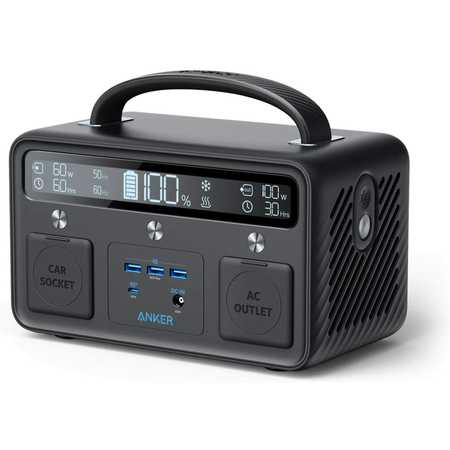expiredbh805 posted Feb 26, 2021 06:42 PM
Item 1 of 1
expiredbh805 posted Feb 26, 2021 06:42 PM
Amazon.com: Anker Portable Generator for Home Use, PowerHouse II 400, 300W/388.8Wh, 110V AC Outlet/60W USB-C Power Delivery Portable Power Station $299
$299
Amazon
Visit AmazonGood Deal
Bad Deal
Save
Share




Leave a Comment
72 Comments
Sign up for a Slickdeals account to remove this ad.
This is absolutely NOT a generator LOL. Title is garbage, and deceptive. Deal post title and product title. Get real, and stop being disingenuous.
Awww. It's enough for me to call it out, and gradually see the number of thumbs up decrease. But thanks
What I'm wondering is why bother with the extra complexity, expense and energy loss of inversion when basically anything you'd want to power in a van, RV or elsewhere where you're off the grid, is now available in DC versions, e.g. lighting, fridges, fans, TVs and other electronics, etc.? Anything high-power like an oven, heater or water heater can run off of propane.
Sign up for a Slickdeals account to remove this ad.
What I'm wondering is why bother with the extra complexity, expense and energy loss of inversion when basically anything you'd want to power in a van, RV or elsewhere where you're off the grid, is now available in DC versions, e.g. lighting, fridges, fans, TVs and other electronics, etc.? Anything high-power like an oven, heater or water heater can run off of propane.
What I'm wondering is why bother with the extra complexity, expense and energy loss of inversion when basically anything you'd want to power in a van, RV or elsewhere where you're off the grid, is now available in DC versions, e.g. lighting, fridges, fans, TVs and other electronics, etc.? Anything high-power like an oven, heater or water heater can run off of propane.
As for laptops,, their batteries are all charged via DC, that's converted from AC via the proverbial power brick, but it's neither complicated nor expensive to replace these with DC versions that are smaller, more energy-efficient and reliable, that run off 12V and have either a fixed output that's correct for a given laptop, or have a variable output. Same thing for a TV. So it can be done, and I imagine some go this route. Even a desktop PC, which is probably not common in van campers, can be powered via DC only, although you'd need a specialized power supply (the van's batteries would serve as the UPS).
I've been tinkering with DC lately, mostly lighting, so it's of moderate interest to me (trying van camper living is something I actually find intriguing, but if I ever did it we're talking years from now). I bought a few 12V DC light bulbs and a USB to 12V adapter to try to add a "mood light" to a small room using solar-charged batteries, and recently lit a dark stairway using a similar setup. I'm surprised at how bright these things are, and how little power they draw.
Basically, my view is if you can power something well and cost-effectively with only DC from source to load, it's worth considering. There are conversion costs in going from AC to DC, of course, but over time the greater efficiency of staying within DC only could pay for it. But I haven't done the math so maybe I'm wrong and we'll always power most things with AC.
I think that if you can do without an inverter, it's preferable. I mean the huge ones that are the size of a toaster oven or bigger. One less expense, complexity and thing that can go wrong. You can always buy a portable car inverter for the one or two items you need one for, if you can't do without.
Our community has rated this post as helpful. If you agree, why not thank spoozy
This is absolutely NOT a generator LOL. Title is garbage, and deceptive. Deal post title and product title. Get real, and stop being disingenuous.
Sign up for a Slickdeals account to remove this ad.
I think that if you can do without an inverter, it's preferable. I mean the huge ones that are the size of a toaster oven or bigger. One less expense, complexity and thing that can go wrong. You can always buy a portable car inverter for the one or two items you need one for, if you can't do without.
Leave a Comment